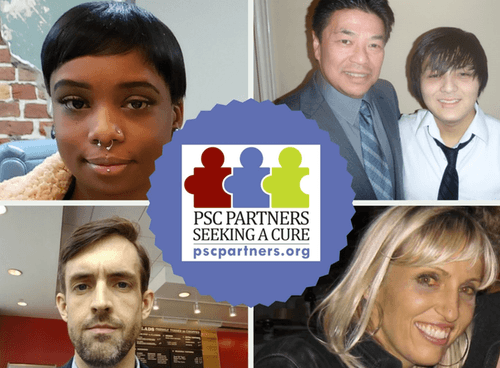
CLICK HERE to download the full PSC Partners Voice of the Patient report
CLICK HERE to download a copy of the Executive Summary of the Voice of the Patient report
The full Executive Summary is also below.
EXECUTIVE SUMMARY

Primary sclerosing cholangitis (PSC) is a rare, progressive liver disease that is estimated to affect around 30,000 children and adults in the United States. Chronic inflammation and fibrosis of the bile ducts of the liver can block the flow of bile, leading to liver damage. Patients with end-stage liver disease or multiple infections of the bile ducts (cholangitis) often require liver transplantation. PSC has also been associated with an increased risk of developing life-threatening cholangiocarcinoma (cancer of the bile ducts), colon cancer, and gallbladder cancer. There is still much that is unknown about the origins and mechanisms of PSC. It appears that PSC is immune-mediated and is associated with both genetic and environmental factors, and there is a strong association between PSC and inflammatory bowel disease (IBD). There are currently no treatments for PSC that have been proven to slow the progression or alter the course of the disease. The only treatment known to improve survival for PSC patients is liver transplantation, but PSC can recur in about 25% of transplanted livers.
On October 23, 2020, PSC Partners Seeking a Cure hosted an interactive virtual public meeting giving patients and caregivers a unique opportunity to share how PSC has impacted their lives. They shared their first-hand experiences with existing treatments and their unique perspectives on the unmet treatment needs of PSC patients. The meeting was developed in conjunction with the U.S. Food and Drug Administration (FDA) as an externally-led Patient-Focused Drug Development (PFDD) meeting, to complement FDA’s PFDD initiative. The patient input collected at the meeting and reported here will have a lasting impact on the lives of PSC patients as it will inform the development and regulatory review of new drugs for this rare disease.
Key Messages from the PSC Partners’ Externally-Led PFDD Meeting
The Symptoms and Daily Impact of PSC that Matter Most to Patients
- PSC Symptoms That Most Impact Patients’ Lives
- Fatigue – extreme, different from being tired, not remedied by sleep
- Pruritus – unrelenting, uncontrollable itch; often painful, interrupts sleep and slows down or prevents all routine activities
- Pain – chronic, often does not improve with medication, impacts daily life, (abdominal, liver, joint, generalized)
- Impaired cognitive function – “brain fog,” loss of identity, memory gaps, inability to function independently
- Mental and emotional health issues – anxiety, depression, post-traumatic stress disorder (PTSD); significant concern for children and young adults with PSC; emotions can intensify physical symptoms
- Other symptoms of concern – insomnia, varices/bleeding varices (enlarged or swollen veins in the esophagus [the tube connecting the throat to the stomach]), loss of appetite/weight loss, nausea/vomiting, as well as the consequences of osteopenia/osteoporosis (bone loss)
- Impact of PSC Clinical Symptoms on Quality of Life
- Unpredictability of PSC disease and the loss of opportunity – “missing out on life,” not being able to attend school, participate in activities and social events, continue a career, maintain a relationship, start a family; the loss of one’s childhood
- Uncertainty about the future - fears of needing a transplant, of not being able to get a transplant, of developing cholangiocarcinoma, of recurrent PSC after transplant, of loss of independence; balancing fear and hope while facing a lack of effective treatments
- Stress on relationships – partners, families, friends, school/work, support systems
- Lack of public understanding of PSC – the challenges of living with a disease that is often invisible, the social stigma associated with visible PSC symptoms; social stigma and bullying can be particular problems for children and adolescents with PSC
- Accessing care –concerns about the MELD scoring system for transplant prioritization, obtaining insurance coverage as a high-risk patient, extensive travel or relocation in pursuit of quality PSC care, transplant, or clinical trial participation
Priority Unmet Needs:
- Much remains unknown about the root causes and disease pathogenesis of PSC. A better understanding is needed of the clinical course of PSC, and the impact of pediatric PSC on growth and development. The true epidemiology of the disease is also not yet fully understood, due in part to the history of PSC not having an ICD-10 code until recently.
- Patients urgently need effective treatments for the symptoms of PSC. The extent, severity, and impact of the symptoms of PSC are still not well-characterized. There are no proven therapies to improve how PSC patients feel and function. Participants vividly described the significant impacts of pruritus, fatigue, and pain, in particular, on their ability to function on a daily basis and on their overall quality of life. Some turn to off-label use of existing medications (e.g., ursodiol, vancomycin) and further studies are needed on the role of these drugs in symptom and/or disease management.
- Transplant is not a cure. Liver transplantation is a high-risk procedure with the potential for serious complications and recurrence of PSC. A true medical cure for PSC is needed.
- More effective screening for early detection of cholangiocarcinoma is needed. Current tools for hepatobiliary cancer surveillance are of low sensitivity and do not identify disease in the early stages when intervention could increase survival.
- Patients urgently need effective treatments for PSC. No treatment has been proven to increase survival of PSC patients. Treatments are needed that slow PSC disease progression, delay the need for transplant, and prevent post-transplant recurrence of PSC.
- Earlier and more efficient diagnosis of PSC is needed. For many, the journey to diagnosis can be long and complicated. Patients also want less invasive methods for risk prediction and prognosis. There is a need to raise awareness of PSC symptoms among providers in general, and to educate providers who treat patients with IBD about the relationship between PSC and IBD.
Taking the Next Steps Together:
- PSC Patients are ready and willing to participate in the search for treatments and a cure. PSC patients are interested in participating in clinical trials and are eager for education and information about the trial process, the safety of the investigational product, and the benefits of trial participation. To better meet patient needs, the patient perspective should be incorporated in the very early stages of clinical trial protocol development, and patients should be respected as an integral part of the clinical trial process. PSC patients can also play an important role in advancing PSC clinical trials by, for example, contributing to efforts to develop a PSC-specific patient-reported outcome tool and surrogate markers of clinical endpoints.
- PSC Partners is ready to help facilitate and expedite research in partnership with industry. PSC Partners can help with study recruitment through the PSC Partners Patient Registry and can help to identify potential barriers to recruitment and retention. PSC Partners can help educate patients about the trial process, foster trust between patients and researchers, and disseminate clinical trial information via social media platforms and other venues. PSC Partners is also actively studying ways of facilitating development of a robust, regulatory-grade natural history database to support clinical trials.
- Considerations for PSC clinical trials:
- Embrace telehealth services to expand the reach of PSC clinical trials and reduce the burden of participation. The COVID-19 pandemic has revealed the power and potential of telehealth services. PSC Partners encourages clinical researchers to leverage telemedicine, home health visits, electronic informed consent, home drug delivery, and home-based surveys to engage more PSC patients in clinical trials.
- Reconsider the need for liver biopsies in clinical trials. The increased sensitivity of imaging technologies can hopefully reduce the need for invasive, risky, and often inconclusive liver biopsy procedures.
- Identify validated surrogate endpoints for PSC clinical trials (and recognize that normalized serum alkaline phosphatase levels do not necessarily correlate with improved quality of life).
- Develop clinical endpoints that focus on treatment outcomes of importance to patients and on patient survival. Create validated, PSC-specific, patient-reported outcome measures for clinical trials, and include patient involvement in all stages of the tool development process.
- Design trials with expanded inclusion criteria. Many patients are willing, but ineligible to participate in a PSC clinical trial (e.g., because they are taking ursodiol).
- Consider creative approaches to collecting pediatric clinical trial data (e.g., including teenage PSC patients in adult clinical trials, incorporating a pediatric pharmacokinetics/pharmacodynamics (PK/PD) sub-study into adult studies).

The Betrayal is Within Me
A Poem by a PSC Patient
How do you escape
How do you win
When the battle
is fought within
Battle lines were drawn
Without my being aware
With the intention to destroy
To take without care
(This is a portion of the poem.)
The full-length recording of the externally-led Patient-Focused Drug Development (PFDD) meeting webcast is available on another page of this website.
Note that this report does not represent any consensus among participants or the broader population of those living with PSC and does not include all possible perspectives.
Complete your profile and join PSC Partners Seeking a Cure in advancing PSC research towards a cure. Find information about clinical trials.





